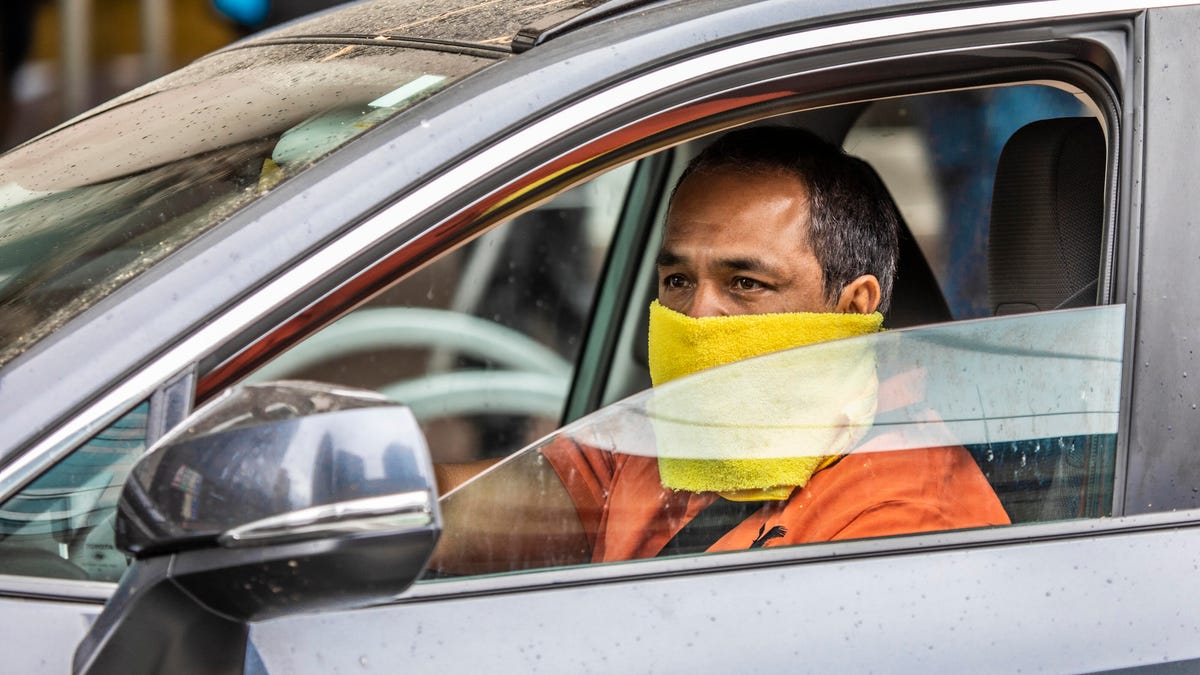Uber engineer speaks out on company's $186M campaign, says it'll hurt drivers
"There's no way around it, Uber's Prop. 22 is a multimillion dollar effort to deny these workers their rights," he says.

Uber and Lyft drivers have held several protests in California demanding to be classified as employees.
As Uber has poured tens of millions of dollars into a California ballot measure to avoid classifying its drivers as employees, one engineer from inside the ride-hailing company spoke out against this campaign on Tuesday. In an op-ed published by TechCrunch, Kurt Nelson said Uber doesn't have drivers' interests in mind.
"Uber works because it's cheap and it's quick," Nelson wrote. "But it's become clear to me that this is only possible because countless drivers are spending their personal time sitting in their cars, waiting to pick up a ride, completely unpaid. Workers are subsidizing the product with their free labor."
Nelson is one of only a handful of gig economy company employees to speak out against Proposition 22. It's been historically rare to see tech workers criticize their employers' positions. But that's starting to change. Google employees organized walk-outs in 2018 over the company's handling of sexual harassment allegations and Facebook employees staged a virtual protest in June after the company refused to take down inflammatory posts by President Donald Trump.
Nelson said he's been a software engineer at Uber for two years, writing code for the company's Android app. But when he was in college, he drove for the ride-hailing company Lyft. He said that experience gave him insight into what it's like to be a driver and how difficult it can be when workers don't have benefits.
Uber, Lyft and other gig economy companies currently classify their drivers as independent contractors, which means the workers pay for their own expenses, such as gas, car maintenance and insurance. Drivers also don't have labor benefits like minimum wage, health insurance or paid sick leave. If they were to be classified as employees, many of those costs would then fall onto the companies.
In an effort to give gig workers more protections, California passed a law last year called Assembly Bill 5. Under the law, many companies that use independent contractors are now required to reclassify their workers as employees. Other states have begun to follow suit. Washington, Oregon, New York and New Jersey are now considering similar legislation.
Instead of reclassifying their drivers in California, however, Uber, Lyft, DoorDash, Instacart and Postmates are bringing the issue to voters in November. They've contributed a total of $186 million to sponsor a ballot measure, Proposition 22, designed to create a carve-out to AB 5. Proposition 22 proposes establishing an alternative to the law that would maintain workers as independent contractors but add benefits such as expense reimbursement and a health care subsidy. It would not take into account the time drivers spend waiting for rides.
Alissa Orlando, a former Uber employee who worked as an operations manager onboarding drivers in East Africa in 2016 and 2017, has also criticized how the company handles drivers. She said she used to be opposed to AB 5, but after seeing how the novel coronavirus pandemic left workers without a safety net, she changed her mind and now she's opposed to Proposition 22.
"When we were developing prices models, we didn't care that drivers were earning less than grocery store clerks because we figured we could always 'recruit more supply,'" Orlando told CNET. "Uber and other gig platforms always advertise gross, rather than net wages, and once someone is on the platform, they're often shocked by the high cost of car depreciation, gas, commercial auto insurance, self employment taxes and countless other business expenses."
Since their inception, Uber and Lyft have struggled to become profitable. And managing a workforce of several thousand drivers could mean millions in added costs.
"At work, management tells us that passing Prop. 22 is for the best because it is critical for the company's bottom line," Nelson wrote in his op-ed. "Yet, a corporation's bottom line will not and should not influence my vote." Nelson asked other tech workers to research the ballot measures and consider whether their employer's interests align with what's good for them and society.
"We agree with Kurt that it's important for voters and employees alike to do their research and make their decisions based on facts. When they do, they'll find that 72% of drivers -- the vast majority -- support Prop. 22," an Uber spokesman said in an email to CNET, citing a survey commissioned by Uber that included responses from 718 gig workers. "That's why we have been advocating for Yes on 22, which will require Uber and other companies to provide health care benefits and earnings guarantees."
Uber's CEO Dara Khosrowshahi has made several media appearances over the last couple of months to lay out the company's plans with Proposition 22. He also wrote an op-ed in the New York Times with the same ideas, proposing a "third way" for the classification of gig workers. On Monday, Khosrowshahi wrote a blog post titled The High Cost of Making Drivers Employees, in which he said if reclassified as employees, "hundreds of thousands of drivers would lose work opportunities overnight."
In his op-ed, Nelson disputed that assertion.
"Were it not for my background as a Lyft driver, I would have accepted my employer's argument at face value," Nelson wrote. "Their business model is the same as any other company's -- cut costs no matter what in order to increase profits ... There's no way around it, Uber's Prop. 22 is a multimillion dollar effort to deny these workers their rights."

